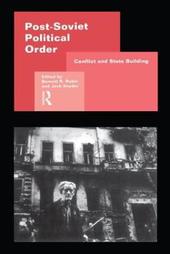
|
Post-Soviet Political Order: Conflict and State-building
Paperback
Main Details
| Title |
Post-Soviet Political Order: Conflict and State-building
|
| Authors and Contributors |
By (author) Barnett R. Rubin
|
|
By (author) Jack Snyder
|
| Physical Properties |
| Format:Paperback | | Pages:224 | | Dimensions(mm): Height 234,Width 156 |
|
| ISBN/Barcode |
9780415170697
|
| Classifications | Dewey:320.947 |
|---|
| Audience | | Undergraduate | | Postgraduate, Research & Scholarly | |
|---|
| Illustrations |
4 line figures
|
|
Publishing Details |
| Publisher |
Taylor & Francis Ltd
|
| Imprint |
Routledge
|
| Publication Date |
9 April 1998 |
| Publication Country |
United Kingdom
|
Description
Post-Soviet Political Order asks what is shaping the institutional pattern of the post-Soviet political order, what the new order will be like, what patterns of conflict are emerging, and what can be done about stabilising the region. In considering these questions the contributors converge on four common themes: the institutional legacy of empire the social processes unleashed by imperial collapse patterns of bargaining within and between states to resolve conflicts arising out of the imperial collapse the impact of the wider international setting on the pattern of post-imperial politics Focusing on the former Soviet Union and Eastern European countries, the contributors show how strong state institutions are essential if conflict and political instability are to be avoided.
Reviews..."the diversity of approaches and theoretical arguments raised among the various contributors is a real strength of the volume....."-John Willerton, University of Arizona "This is by far one of the most sophisticated analyses of the problems facing the post-Soviet area."-Richard Sakwa ""Post-Soviet Political Order, a monograph written by a group of eight scholars, seven of whom are associated with Columbia University, looks at conflicts between the new independent countries through the prism of state-building and nation-building."-Sergei Plekhanov "York University ..."I can honestly say that I am impressed.... I doung the general approach both novel in the context of post-Soviet studies, and vital to our understanding of what is going on (and what may go on in the future)."-Ronald Hill, University of Dublin
|